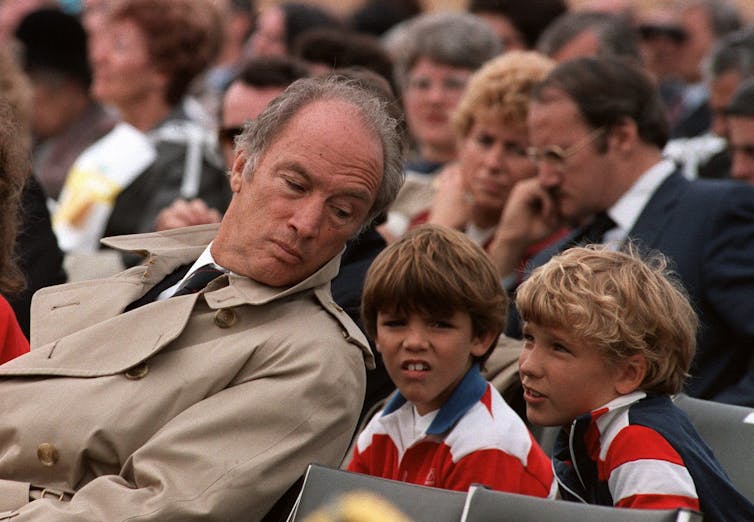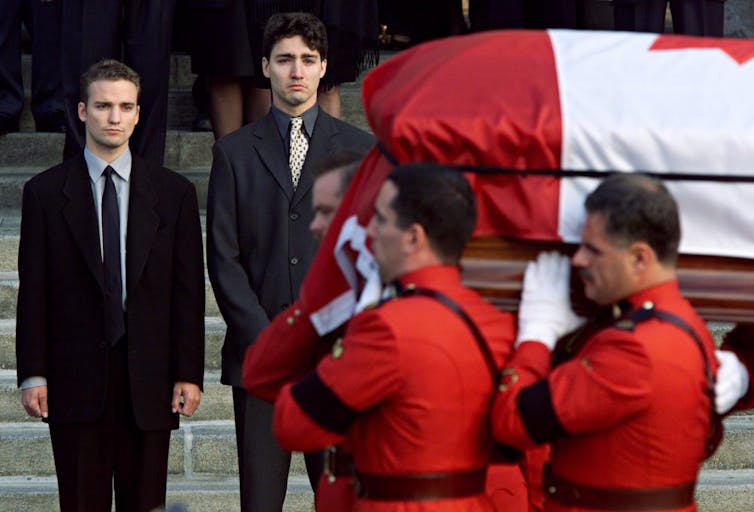Pierre Elliott Trudeau is arguably the best known of all of Canada’s prime ministers aside perhaps from its first, John A. Macdonald. To this day, Trudeau inspires both love and hatred in Canadians.
Feb. 29, 2024 marks the 40th anniversary of Trudeau’s resignation after his famous walk in the snow in Ottawa, where he decided to permanently retire from politics. As his son, Prime Minister Justin Trudeau, faces repeated questions about his own political future, it’s worth looking back on the elder Trudeau’s political career — and his decision to quit.
There are certainly parallels between father and son in terms of the political environment after many years holding down Canada’s top job.
A different leader for difficult times
Thrust on the national stage in the mid-1960s from relative obscurity as the country faced an existential crisis around national unity, Pierre Trudeau became the dominant Canadian politician of his generation, serving as prime minister for 15 years and 164 days.
Canada was a troubled nation when it elected Trudeau prime minister in 1968.
Québec was seriously reconsidering its place in the federation. Provinces that had not participated fully in the post-Second World War economic boom demanded a more equitable nation. Indigenous Peoples and Canadians disenfranchised because of their gender, ethnicity and sexuality sought a more inclusive and just society.
The time was ripe for a new kind of political leader. Trudeau was that leader, and remained so until he announced his resignation as prime minister and Liberal Party leader for a final time.
It was fitting, as something of an iconoclast, that Trudeau chose to announce he was quitting in a leap year and on a day that comes around only once every four years. The anniversary could only be marked sporadically. This was in keeping with how Trudeau rarely took the traditional path.
Charismatic and intellectual, he was determined to be different from the 14 prime ministers who came before him. He cultivated the image of trailblazer, gunslinger, outsider — resolute, moody and distant, but cerebral and determined to vanquish all those who threatened Canada.
Canadians had never seen such a leader and many of them would soon warm to both his theatrics and his straightforward personality.
THE CANADIAN PRESS/Doug Ball
Yet he was very much a consummate politician. Although he created the impression that his every action was spontaneous, every word unscripted, and every gesture unplanned, it was nothing of the sort.
His pirouette at Buckingham Palace is just one example. Captured on camera and broadcast around the world, it showed Trudeau as irreverent, a world leader who held pomp and ceremony in contempt. But Trudeau knew there was a camera pointed at him and the pirouette was planned.
Similarly, many of his off-the-cuff speeches were rehearsed, his shrugs for the camera carefully prepared.
Previous promise to resign
When Trudeau announced his resignation 40 years ago, it too was carefully contemplated and not simply a spur-of-the-moment decision made mid-blizzard. He said he made the final decision a day earlier and decided it was the right call when he woke up the next morning.
Most newspapers, however, reported that his announcement had caught friends and foes alike by surprise. Parliament was on its winter break.
But earlier that same week, Liberal Party president Iona Campagnolo had talked to Trudeau about his future.
He telephoned a couple of days later saying he was sending a secretary over with a “Dear Iona” letter. She was not surprised it was a letter of resignation.
Trudeau himself had promised during the 1980 election that he’d retire before the next election. It was just a matter of when he would announce it. Campagnolo, not Trudeau, made the announcement.
Trudeau later told reporters he came to the decision to put an end to almost 16 years as prime minister after a long, solitary walk through a blinding blizzard that shut down the city.
“I had a good day yesterday, worked on Aboriginal rights [for an upcoming constitutional conference], and it seemed like a good day to have a last day … it was a great walk in the snow,” he said.
It was the second time he had resigned but — unlike in 1979 — this time was final.

(CP PHOTO)
Approval ratings sunk
Hollywood would find it hard to write a better script. The announcement was the ultimate in anti-politics, the move of a great politician to the very end.
Trudeau worked hard to create an image of going against the grain and forging a new path, and it contributed to the public’s fascination with him.
His resignation and retirement were not really surprising. Sixty-five at the time, he had been in politics for more than two decades and his party was sinking in the polls.
Fewer than 20 per cent of those surveyed believed Trudeau was the best leader for the country. Four decades later, his son is similarly languishing in the 20s and low 30s in approval ratings.

THE CANADIAN PRESS/Chuck Mitchell
Members of Trudeau’s caucus were also becoming increasingly unhappy with his leadership. Even trusted lieutenants like Marc Lalonde were reportedly telling him he should go for the good of the Liberal party.
Nonetheless it was a historical run. Trudeau had a number of remarkable achievements, notably the patriation of the Constitution, complete with an entrenched Charter of Rights and Freedoms.
Canada inked a landmark constitutional accord 40 years ago — and it’s still causing problems
Perhaps his greatest accomplishment was to change the narrative around Canada’s national identity.
At the 1969 Liberal leadership convention, Trudeau promised to make Canada a just nation, where “two great linguistic communities and people of many cultures will live in harmony and in which every individual will find fulfilment.”
40 years later: A look back at the Pierre Trudeau speech that defined Canada
Canada evolved under Trudeau
Canada has become that nation. Yet, when Trudeau resigned, the country was as divided as when he became prime minister, despite prioritizing national unity for 16 years.
Two sovereignty referendums were held in Québec — one in 1980, when he was prime minister, and the next in 1995. Both were unsuccessful.

(CP PHOTO/Frank Gunn)
On the 40th anniversary of Pierre Trudeau’s resignation and with another leap year upon us, speculation that Justin Trudeau may take his own long winter walk to consider his political future isn’t surprising.
Like it was in 1984, the country is divided. The Liberal Party is once again low in the polls and Trudeau is unpopular. The Liberal caucus is worried about its prospects with an election looming, and party insiders are whispering that Trudeau should go for the good of the party and the nation.
If he does, it’s unlikely he’ll be celebrated as his father was. Although Justin Trudeau has won three elections, Canadians seem at the moment to lack the same respect and affection for the son as they had for his father.




